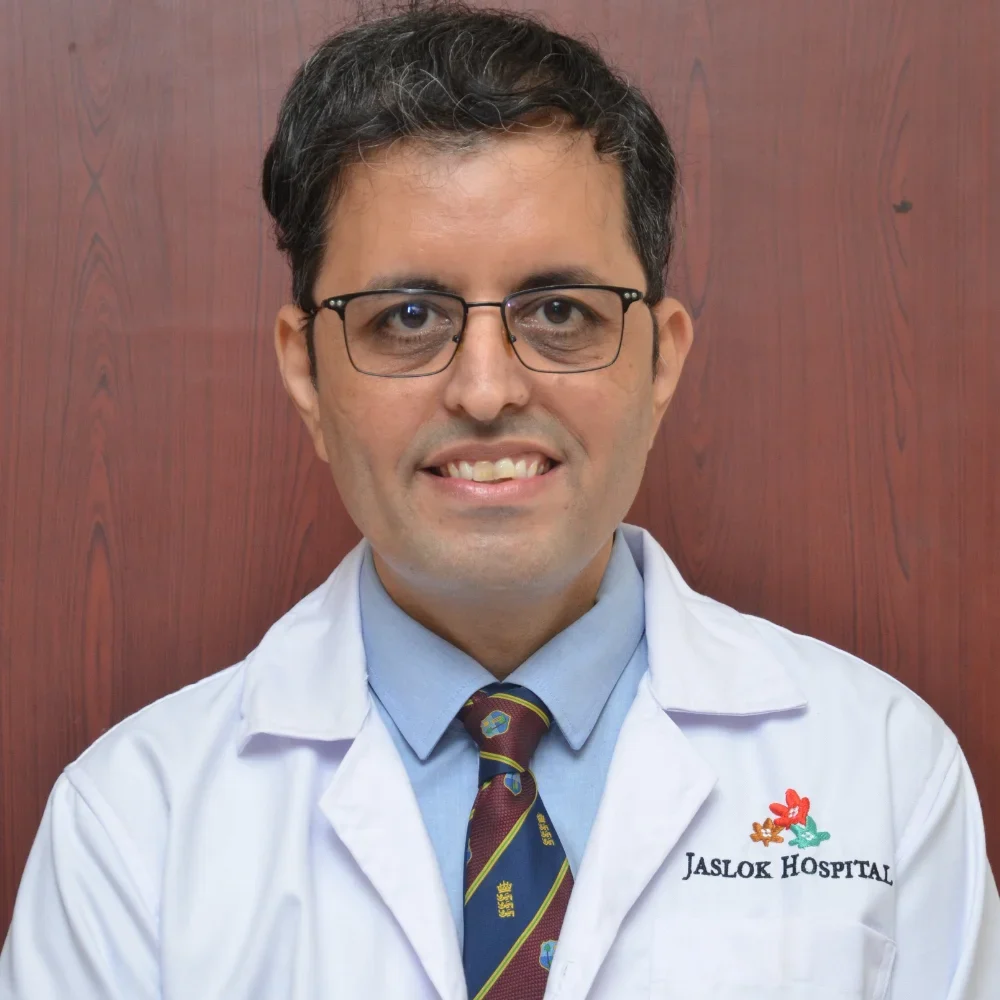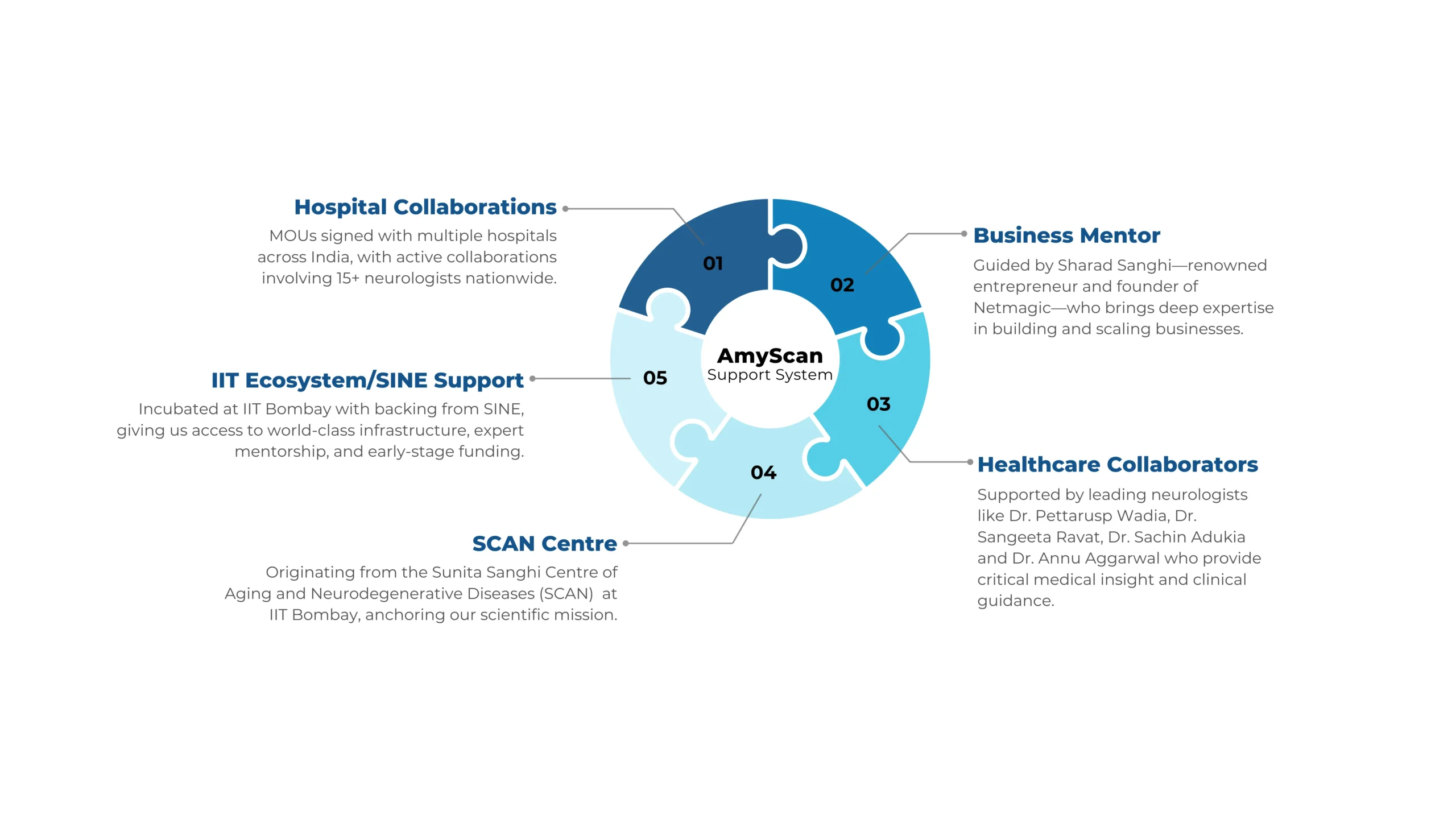About Us
Prof. Samir K. Maji
Founder & Director, AmyScan Healthcare
Professor, IIT Bombay
https://www.bio.iitb.ac.in/~maji/
Professor-in-charge, Sunita Sanghi Centre of Aging and Neurodegenerative Diseases (SCAN)
https://www.scan.iitb.ac.in/

AmyScan is built on more than a decade of research led by our founder, Prof. Samir Maji, a global expert in protein misfolding, aggregation, and amyloid biology. Prof. Maji has conducted research at leading institutions including Harvard Medical School, UCLA, the Salk Institute, and ETH Zurich.
Currently a Professor at IIT Bombay and Professor-in-Charge at SCAN, he brings unparalleled expertise in the biology of Parkinson’s and Alzheimer’s to our translational mission—bridging the gap between academic discovery and clinical application.

Minimally
Invasive
Highly
Accurate
Clinically
Validated
Cost
Effective
About Us
AmyScan Healthcare was founded at IIT Bombay, emerging from pioneering research at the Sunita Sanghi Centre of Aging and Neurodegenerative Diseases (SCAN) and the Department of Biosciences and Bioengineering.
We aim to transform how amyloid-based neurodegenerative diseases are diagnosed, starting with Parkinson’s Disease, through early detection using a simple, accurate, and accessible blood test. By detecting disease-specific amyloid markers in the blood at their earliest stages, our minimally invasive and cost-effective approach enables timely intervention and improved patient outcomes.
What We Do
At the heart of our innovation is a patented protein-based technology that enables the detection of ultra-low levels of circulating α-synuclein amyloid seeds, a key biomarker of Parkinson’s disease, from a simple blood assay. Using a process similar to PCR, our platform has the potential to amplify these minute signals, providing highly sensitive and accurate results. This will empower the clinicians to make faster, more accurate decisions.
AmyScan envisions transforming the diagnosis and management of amyloid-based diseases by translating cutting-edge research into a high-throughput, clinically accessible diagnostic tool. By detecting trace amounts of amyloid seeds in circulation, we aim to enable timely diagnosis and intervention, paving the way for more effective treatment strategies.

Business Mentor
Mr. Sharad Sanghi
Mr. Sharad Sanghi is a highly respected entrepreneur and distinguished alumnus of IIT Bombay, with over 25 years of experience in building and scaling successful startups. Founder of Netmagic (acquired by NTT), he brings deep expertise in technology infrastructure and business growth. Mr. Sanghi is also Co-Chairman of the Confederation of Indian Industry (CII) and associated with ASSOCHAM. He actively mentors the startup and contributes both strategic guidance and potential investment. He is also the donor of the Sunita Sanghi Centre of Aging and Neurodegenerative Disorders (SCAN) at IIT Bombay
Collaborators / Clinical Advisors

Dr. Sangeeta Ravat
Dr. Ravat is a distinguished Professor and Dean at KEM Hospital with over 31 years of experience in neurology and neurodegenerative diseases. Her profound compassion and dedication highlight her exceptional leadership and the positive impact she has made in healthcare. With her clinical expertise and insights into patient care, she is an invaluable guide in shaping our diagnostic platform.

Dr. Pettarusp M. Wadia
Dr. Wadia is an eminent neurologist at Jaslok Hospital & Research Centre, specializing in movement disorders with 29 years of experience. He holds an MD, DM, and multiple fellowships, and has authored over 40 research papers, 9 book chapters, and co-edited the second edition of the textbook Parkinson’s Disease and Movement Disorders. His academic leadership and deep domain knowledge help ensure our work aligns with the highest medical standards.

Dr. Annu Aggarwal
Dr. Annu Aggarwal holds an MBBS, MD Medicine, and DNB Neurology. She is a consultant neurologist at Kokilaben Dhirubhai Ambani Hospital. With +25 years of practice and experience in Neuroscience and Neurodegenerative Diseases, her experience in this field will be of immense value in helping us better understand the needs of the patients and clinicians for improving the technology.

Dr. Sachin Adukia
Dr. Adukia holds an MBBS, MD (Medicine), and DNB (Neurology), and is a consultant neurologist at Dr. L.H. Hiranandani Hospital, Powai. With over 12 years of experience in neurodegenerative diseases and managing complex neurological emergencies, he also established the Movement Disorder Clinic at Hiranandani Hospital. His expertise will be invaluable in guiding the advancement and clinical validation of our technology.
Advisory Board (International) - will be updated soon
Our Ecosystem

Supported By






